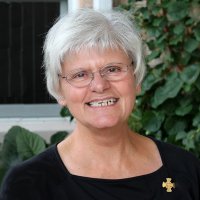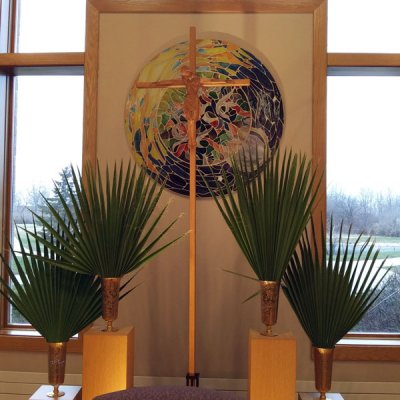(photo: Palm Sunday at St. Francis Convent, Green Bay)
No matter his responsibilities or time commitments, St. Francis of Assisi made prayer a priority
 by Sister Laura Zelten
by Sister Laura Zelten
Our lives are so easily fragmented these days between responsibilities to friends, family, neighbors, and the larger human family that we may think we don’t have the time or energy for prayer, especially as we continue to celebrate the sacred mysteries through social distancing. That was the experience of St. Francis of Assisi up until his mid-20s. Then he discovered that prayer was more real than many of the things he had considered more important.
Only in prayer were his knightly ambitions turned in a new direction; only in prayer did he find the strength to lead the people who wanted to follow him. Prayer enabled him to discover the link between the Church that Jesus established and the Church that needed conversion to Jesus' ways.
During these days of Holy Week I like to pray the scriptures of each day. They spring from every part of our emotional spectrum and lead us to the same point: gratitude for God’s generosity and a desire to imitate it as much as we can here and now. Francis prayed these same scripture passages, and those who followed him quickly did so, too. His followers learned the scriptures and prayed them as they walked from place to place, reflecting on what God had accomplished through them in their previous location and preparing for what God might ask of them in the next place.
Prayer enabled St. Francis of Assisi to see the connections in what otherwise could have been a very fragmented life: preacher, healer, leader of friars, spiritual guide for many lay people, and advisor to popes and bishops. Rather than ask how he could find time and energy to pray, Francis asked himself, “How could I not pray?”
These days give us much to reflect upon in prayer. For Franciscans, we realize that we do not “go to God” but rather God has come to us in the Incarnation. During Holy Week, God comes to us through the events of his suffering, death and resurrection and we again hear the words “do this in memory me." Please know our prayers are with you as we unite, from a distance, to celebrate the death and resurrection of Jesus.

This Wednesday of Holy Week, 2020, as I learn that the 'unfinished' Cathedral Church St. John the Divine in New York City will become a temporary hospital for COVID-19 patients, this unique occurrence draws me into prayer and reflection. The images, timing, and happenings of this historical event have much to say to me. Was the Church once considered to be a House of Healing? I can research this question and learn.
The words "hospital" and "hospice" derive from Latin 'hospitum,' meaning "'hospitality or place of rest and protection for the ill and weary.' Historians believe the first hospices originated in Malta around 1065, dedicated to caring for the ill and dying en route to and from the Holy Land." (Wikipedia) How interesting that it was on the journey to and from the Holy Land, itself, that people first established places of care for the ill and dying!
People through the ages have referred to the Church as a hospital, sometimes offering us the image of JESUS as the Divine Physician or Healer who, "came to call sinners, not the righteous," (Lk. 5:32), making the Church a hospital for sinners. In the spirit of renewal of Vatican II, it was often said the Church is a hospital, not a museum.
And it was Pope Francis, who, in an interview in August, 2013, said, “I see clearly that the thing the church needs most today is the ability to heal wounds and to warm the hearts of the faithful; it needs nearness, proximity. I see the church as a field hospital after battle."
So ...... this 'unfinished,' and one of the world's largest cathedrals, is speaking to us today. Just as surely as the Temple spoke its message of the Times to JESUS; just as surely as the frail, falling chapel spoke its message of the Times to Francis. If, in these Times, we listen, with "ears that are opened, morning after morning," (Is. 50:
4 - today's First Reading), will we, too, hear the call of the Spirit to re-form, re-build, and re-structure Church? What does that call mean for us? Wherein can we find the movement, inspiration, guidance, and will to proceed?